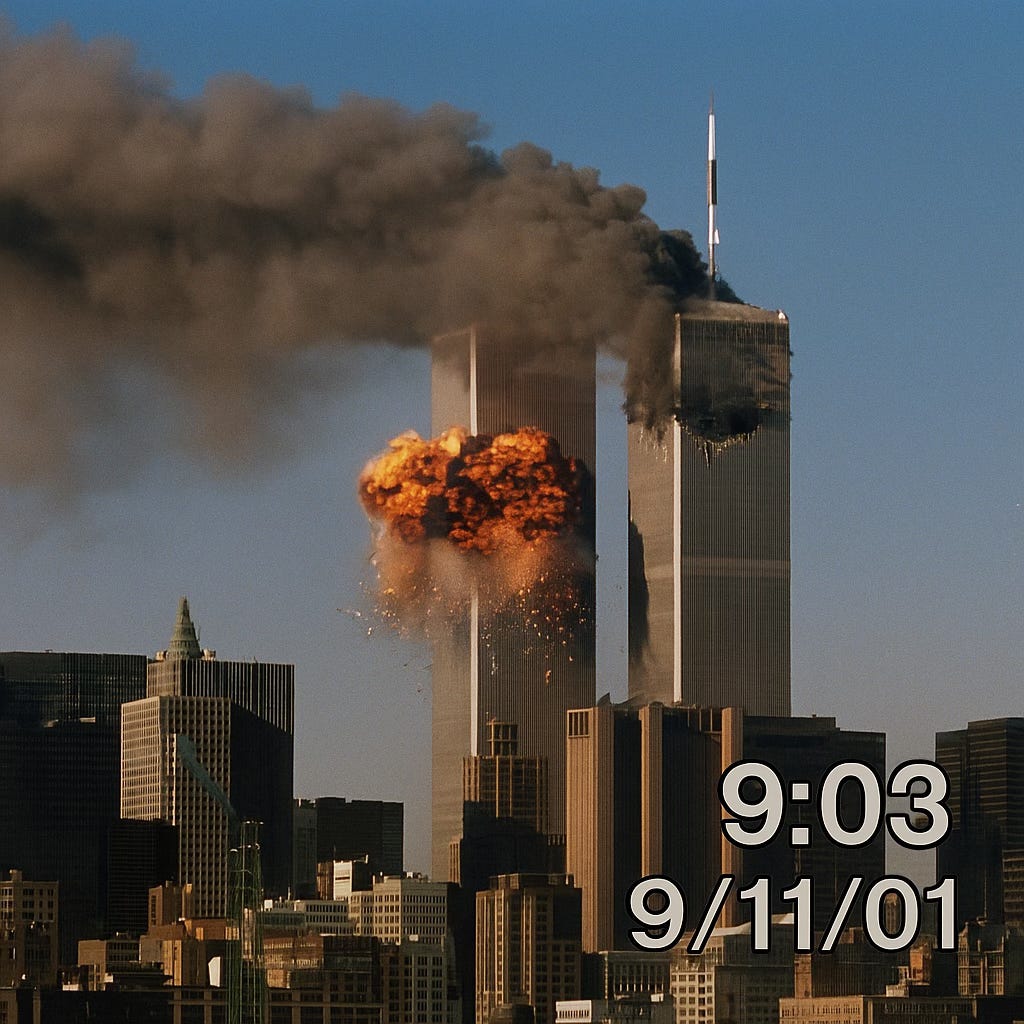Where I Was on September 11, 2001
Memory, mythology, and the moment the curtain tore.
Tuesday morning. Graduate school, settling into a new semester. Downtown Richmond. We were on a quick class break, drifting into the computer lab. This was 2001—no smartphones, no Twitter, no endless scroll of breaking news. If you wanted information, you had to wrestle with a sluggish desktop and hope the internet gods smiled on you. That morning, they didn’t. The system was jammed. Nobody could get their email.
Finally, one of my classmates managed to pull up a headline: a plane had hit the World Trade Center. At first it sounded like some freak accident, the kind of thing you’d skim past in the paper the next day - it had happened before. Then we rolled a clunky TV into the classroom and saw, live, the second plane hit at 9:03 a.m. A fireball bloomed against the Manhattan skyline, and the room fell silent. Professors drifted in, abandoning their offices to stand with us. No one spoke.
We tried calling friends in New York and D.C. but the phones—cell or landline—were useless, every circuit jammed. Everyone knew someone who could be in the next “strike zone.” My girlfriend at the time worked in Alexandria, just across the river from the Pentagon. When the news broke at 9:37 a.m. that another plane had slammed into it, my stomach dropped. Hours passed before I could finally reach her. She was safe. We both worried about a college friend who worked at the World Trade Center site. She wasn’t in the twin towers that morning and managed to escape the area, but what she described from the street was nightmarish.
At some point—maybe late morning, maybe early afternoon—word spread that parts of downtown Richmond were being cleared out. Between the Federal Reserve branch and the other federal buildings near VCU, nobody wanted to take chances. We filed out, half in silence, half in disbelief. I drove back to my apartment in The Fan, passing through VCUs Academic Campus on streets that felt unnervingly deserted, quiet, like the city itself was holding its breath.
The rest of the day I sat in front of the television. The images played on loop: 8:46 a.m., the North Tower; 9:03 a.m., the South Tower; 9:59 a.m., the South Tower collapses; 10:28 a.m., the North Tower follows. It didn’t matter how many times they replayed—it never looked real. What I remember most isn’t even the fireball or the smoke, but the silence of that classroom in Richmond, when a room full of students and professors simply froze. Language had failed us.
For weeks afterward, that silence gave way to fever. Flags sprouted on porches, “God Bless America” poured out of radios, and strangers hugged in the street. I even went so far as completing my physical to join the Navy as an officer in the Medical Service Corps. It never occurred to me that if I’d signed, I might be stepping into a war that would drag on for twenty years.
Part of that was the story we’d been raised on. In the eighties and nineties, we grew up on weekday afternoons with G.I. Joe and Saturday nights with Tom Clancy movies, Top Gun, my favorite was Rocky IV—the Cold War reduced to caricatures and a boxing match while James Brown belted “Living in America.” Growing up our parents and grandparents told us stories about Normandy, Korea, even Vietnam—which got papered over with “Peace with Honor” as if it hadn’t been a loss. The message was always the same: America was the 800-pound gorilla. America always won.
So in those first stunned days, a lot of us assumed we’d just bomb a country, plant a flag, and move on. “Look what happened to the last country that had the nerve to attack the US!” was a popular refrain. Bush in a flight suit on the USS Abraham Lincoln deck in 2003, strutting beneath a Mission Accomplished banner, was almost exactly the movie ending we’d been taught to expect. I even believed he’d flown the jet himself. That’s how deep the mythology ran.
But when Obama announced in 2011 that Bin Laden was dead, it didn’t feel like the final scene. The wars were still dragging on. Al-Qaeda had already morphed, leaders replaced, franchises spawning, eventually giving rise to ISIS. It was never just one man. They were more committed than we were, willing to fight to the last man. And we, for all our wealth and weapons and bravado, couldn’t seem to stop it.
Looking back, 9/11/01 was the moment the curtain finally tore. We knew then that the myth of America as the last great world superpower was starting to crumble. What we grew up believing—that we were untouchable, unbeatable—was exposed as fantasy. And in that collapse you can trace the path forward: through the wars that wouldn’t end, the erosion of trust in government, and the rise of a politics built on grievance. Historians will mark 9/11 not just as the day the towers fell, but as the beginning of how we got to Trump—and everything that came with him.
And now there are adults who weren’t alive that day. To them, 9/11 is grainy footage, textbook paragraphs, anniversary hashtags. But for those of us who remember the silence, the smoke, and the sense that the world had shifted on its axis, the weight is different. We know what it felt like when the myth cracked. We’ve been living in its aftershocks ever since.



